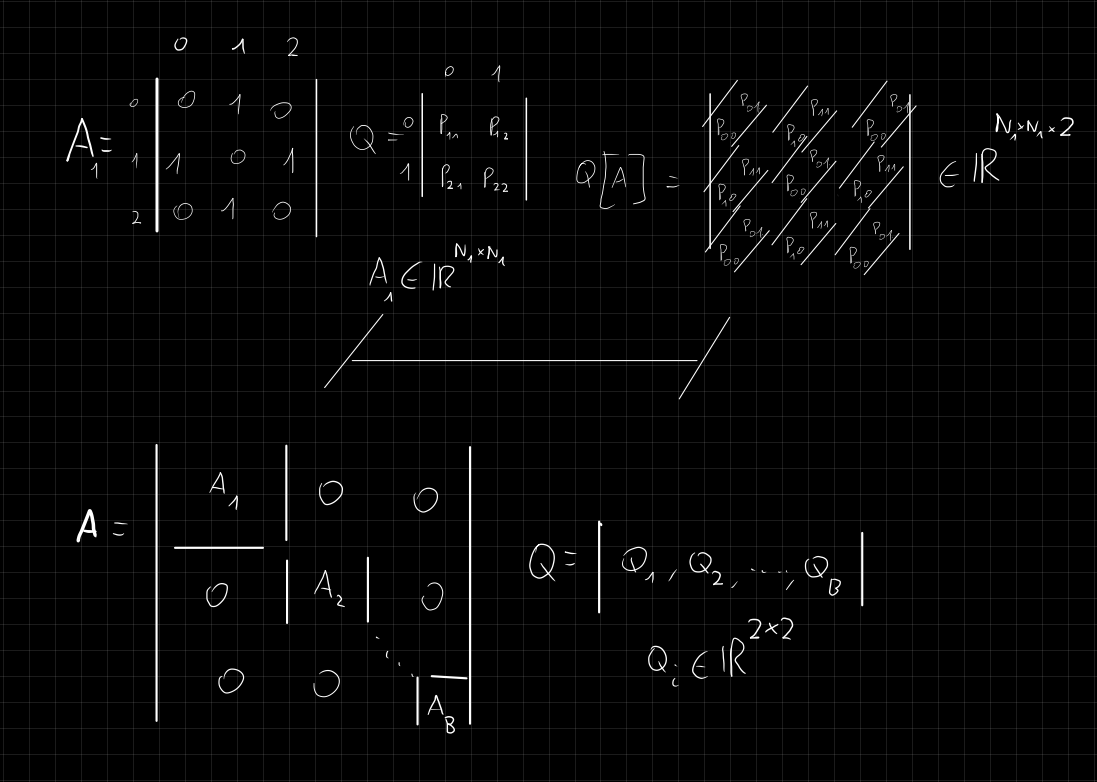This answer is assuming that your matrix is square and the size of the patches are also square.
But I think the best option is to do it with a for loop (maybe there is a better option but idk)
A_n = torch.randint(0, 2, (4, 3, 3))
A = torch.block_diag(A_n[0], A_n[1], A_n[2], A_n[3])
print(A)
Q = torch.rand(4, 2, 2)
size_patch = 3
QA = torch.zeros(*A.shape, 2)
for i, idx in enumerate(range(0, A.shape[0], size_patch)):
QA[idx:idx+size_patch, idx:idx+size_patch] = Q[i, A[idx:idx+size_patch, idx:idx+size_patch], :]
torch.set_printoptions(precision=2)
print(f"Probability that the values are 0:\n\n{QA[:,:,0]}\n\n")
print(f"Probability that the values are 1:\n\n{QA[:,:,1]}")
# Output:
tensor([[0, 1, 0, 0, 0, 0, 0, 0, 0, 0, 0, 0],
[1, 1, 0, 0, 0, 0, 0, 0, 0, 0, 0, 0],
[0, 0, 0, 0, 0, 0, 0, 0, 0, 0, 0, 0],
[0, 0, 0, 1, 0, 1, 0, 0, 0, 0, 0, 0],
[0, 0, 0, 1, 0, 1, 0, 0, 0, 0, 0, 0],
[0, 0, 0, 1, 0, 0, 0, 0, 0, 0, 0, 0],
[0, 0, 0, 0, 0, 0, 0, 0, 1, 0, 0, 0],
[0, 0, 0, 0, 0, 0, 1, 0, 1, 0, 0, 0],
[0, 0, 0, 0, 0, 0, 1, 0, 1, 0, 0, 0],
[0, 0, 0, 0, 0, 0, 0, 0, 0, 0, 0, 0],
[0, 0, 0, 0, 0, 0, 0, 0, 0, 0, 0, 0],
[0, 0, 0, 0, 0, 0, 0, 0, 0, 0, 1, 0]])
Probability that the values are 0:
tensor([[0.99, 0.61, 0.99, 0.00, 0.00, 0.00, 0.00, 0.00, 0.00, 0.00, 0.00, 0.00],
[0.61, 0.61, 0.99, 0.00, 0.00, 0.00, 0.00, 0.00, 0.00, 0.00, 0.00, 0.00],
[0.99, 0.99, 0.99, 0.00, 0.00, 0.00, 0.00, 0.00, 0.00, 0.00, 0.00, 0.00],
[0.00, 0.00, 0.00, 0.96, 0.25, 0.96, 0.00, 0.00, 0.00, 0.00, 0.00, 0.00],
[0.00, 0.00, 0.00, 0.96, 0.25, 0.96, 0.00, 0.00, 0.00, 0.00, 0.00, 0.00],
[0.00, 0.00, 0.00, 0.96, 0.25, 0.25, 0.00, 0.00, 0.00, 0.00, 0.00, 0.00],
[0.00, 0.00, 0.00, 0.00, 0.00, 0.00, 0.42, 0.42, 0.56, 0.00, 0.00, 0.00],
[0.00, 0.00, 0.00, 0.00, 0.00, 0.00, 0.56, 0.42, 0.56, 0.00, 0.00, 0.00],
[0.00, 0.00, 0.00, 0.00, 0.00, 0.00, 0.56, 0.42, 0.56, 0.00, 0.00, 0.00],
[0.00, 0.00, 0.00, 0.00, 0.00, 0.00, 0.00, 0.00, 0.00, 0.64, 0.64, 0.64],
[0.00, 0.00, 0.00, 0.00, 0.00, 0.00, 0.00, 0.00, 0.00, 0.64, 0.64, 0.64],
[0.00, 0.00, 0.00, 0.00, 0.00, 0.00, 0.00, 0.00, 0.00, 0.64, 0.96, 0.64]])
Probability that the values are 1:
tensor([[0.19, 0.47, 0.19, 0.00, 0.00, 0.00, 0.00, 0.00, 0.00, 0.00, 0.00, 0.00],
[0.47, 0.47, 0.19, 0.00, 0.00, 0.00, 0.00, 0.00, 0.00, 0.00, 0.00, 0.00],
[0.19, 0.19, 0.19, 0.00, 0.00, 0.00, 0.00, 0.00, 0.00, 0.00, 0.00, 0.00],
[0.00, 0.00, 0.00, 0.29, 0.39, 0.29, 0.00, 0.00, 0.00, 0.00, 0.00, 0.00],
[0.00, 0.00, 0.00, 0.29, 0.39, 0.29, 0.00, 0.00, 0.00, 0.00, 0.00, 0.00],
[0.00, 0.00, 0.00, 0.29, 0.39, 0.39, 0.00, 0.00, 0.00, 0.00, 0.00, 0.00],
[0.00, 0.00, 0.00, 0.00, 0.00, 0.00, 0.98, 0.98, 0.29, 0.00, 0.00, 0.00],
[0.00, 0.00, 0.00, 0.00, 0.00, 0.00, 0.29, 0.98, 0.29, 0.00, 0.00, 0.00],
[0.00, 0.00, 0.00, 0.00, 0.00, 0.00, 0.29, 0.98, 0.29, 0.00, 0.00, 0.00],
[0.00, 0.00, 0.00, 0.00, 0.00, 0.00, 0.00, 0.00, 0.00, 0.25, 0.25, 0.25],
[0.00, 0.00, 0.00, 0.00, 0.00, 0.00, 0.00, 0.00, 0.00, 0.25, 0.25, 0.25],
[0.00, 0.00, 0.00, 0.00, 0.00, 0.00, 0.00, 0.00, 0.00, 0.25, 0.74, 0.25]])
